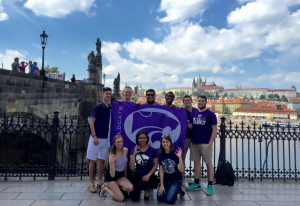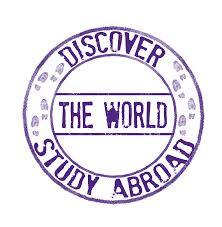 Studying Abroad is one of the most valuable and life-changing activities a student can participate in during their college experience. In today’s global economy, K-State students need to enter the workforce with international
Studying Abroad is one of the most valuable and life-changing activities a student can participate in during their college experience. In today’s global economy, K-State students need to enter the workforce with international  experience and skills in order for them to be competitive in today’s global workforce. While students are having experiences and developing skills that employers value, they are also making progress towards their graduation requirements. K-State’s Study Abroad Office has joined a nationwide commitment to double the number of U.S. students studying abroad by the end of the decade.
experience and skills in order for them to be competitive in today’s global workforce. While students are having experiences and developing skills that employers value, they are also making progress towards their graduation requirements. K-State’s Study Abroad Office has joined a nationwide commitment to double the number of U.S. students studying abroad by the end of the decade.
More on the value of study abroad and K-State’s commitment to the Institute of International Education’s  Generation Study Abroad Initiative:
Generation Study Abroad Initiative:
Kansas State University is joining with the prestigious Institute of International Education to encourage more students to have international academic experiences.
 The university will help the institute’s Generation Study Abroad commitment to double the number of U.S. students studying abroad by the end of the decade — equivalent to 600,000 students nationwide studying abroad by the end of the decade. More than 150 universities have joined the commitment.
The university will help the institute’s Generation Study Abroad commitment to double the number of U.S. students studying abroad by the end of the decade — equivalent to 600,000 students nationwide studying abroad by the end of the decade. More than 150 universities have joined the commitment.
As a partner, Kansas State University will increase its yearly study abroad student participation by 20 percent — which will be nearly 960 students studying abroad in the 2019-2020 school year, said Joe Milostan, assistant director of the study abroad office.
“The more students who graduate with international experience, the more competitive our graduates will be entering the job market,” Milostan said. “Most job fields are global fields and there is a significant interaction among countries. Students need international skills to be competitive in a global economy.”
The commitment coincides with study abroad growth at Kansas State University. Study abroad involvement has increased every year since 2011 and the university had about 700 students study abroad for the 2012-2013 school year.
“The international programs office has increased the number of study abroad scholarships significantly and has added exchange opportunities with international universities, including highly regarded institutions such as the University of Sydney or Carlos III in Madrid,” said Marcelo Sabatés, associate provost for international programs. “Faculty-led programs also have increased significantly. All that explains the nearly 40 percent increase in study abroad numbers in the last two years.”
Sabatés also praised Karli Webster, director of the study abroad office, and her team for joining the Generation Study Abroad commitment.
“Global experiences are no longer a luxury; they are part of what being educated means in this century, and our study abroad office fully understands that,” he said.
The university is aiming to be a Top 50 public research university by 2025. The initiative’s internationalization goals include increasing study abroad numbers to reach 25 percent of the student body by the year 2025.
“Generation Study Abroad is a natural commitment for us because we are already invested in increasing study abroad numbers as part of Kansas State University’s 2025 initiative,” Milostan said.
To encourage more students to study abroad, Milostan said the university will achieve several steps, including:
• Expanding curriculum integration. By talking with departments and discussing how study abroad fits into their curricula, advisers can determine where departments should send students, what year students should go and what kind of classes students should take.
• Increasing scholarships through donor outreach. By coordinating with the Kansas State University Foundation, the study abroad office plans to build even more study abroad scholarship opportunities, particularly for freshmen.
• Improving outreach to historically underrepresented study abroad participants.The student who is most likely to study abroad is a white female student who is majoring in humanities or social sciences, Milostan said. The study abroad office wants to reach underrepresented study abroad participants, including minority students, nontraditional students and first-generation students, among others.
• Offering more international internship programs.The university is interested in increasing the number of students who are doing internships outside of the U.S.
“The study abroad goals in the university’s 2025 initiative cannot be achieved by the study abroad office alone,” Milostan said. “We need other departments and colleges at Kansas State University working with us to achieve these goals. If we meet the 2025 goals, we will also meet the goals in the Institute of International Education’s Generation Study Abroad commitment, which is very exciting.”
